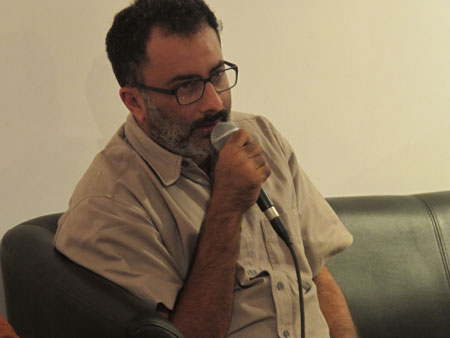|
A panel discussion titled 'The Masters' transpired on February 8 2014, chaired by Deepa Punjani, the Editor of Mumbai Theatre Guide at the ICIA Gallery, Kala Ghoda Festival. It was hosted by Avid Acceleration. The panelists included Ramu Ramanathan, Anup Soni, Shernaz Patel, Mahesh Dattani, Salim Arif and Vinod Rangnath. They were there to speak about some of Mumbai's theatre masters whose contribution is not acknowledged enough.
Ramu Ramanathan kicked off the evening and spoke about Shahir Sambhaji Bhagat. Sambhaji Bhagat is a singer, writer, a Dalit activist leader, director, actor, and producer. He is a Lok Shahir (People's poet) from Maharashtra. Through his fiery performances which include powadas and lok sangeet, Bhagat talks about caste discrimination and the problems faced by the poor.
|
 |
|
|
Ramu Ramanathan |
|
Sambhaji Bhagat deploys a duff (a round drum that is held in the hand) for most of the performances and stages his shows in bastis and maidans across the state. Ramanathan said, ''Bhagat is Bob Dylan, Eminem, Antonio Gramsci, Noam Chomsky and Vivek Chibber, all rolled into one. His performances make the politics of Phule, Ambedkar and Marx, very clear, and very accessible to everyone.''
Shahir Bhagat has mentored various groups like the Kabir Kala Manch and the Deshbhakti Yuva Manch in the art of composing songs and a few performance tricks. These could be about social evils or promoting inter-caste marriage or campaigns against anti-superstition.
Ramanathan said, ''Ambedkarites are today's bad boys in Maharashtra. All that they say or do is under surveillance.''
Bhagat also known as Maharashtra's Gaddar (after the Telugu activist and balladeer Gummadi Vittal Rao) is trying to counter this. Bhagat's play SHIVAJI UNDERGROUND IN BHIMNAGAR MOHALLA has had more than hundreds of shows in the past few months. Ramanathan mentioned how some auditoriums denied the play a show because of its ''provocative content.''
The play has a simple intent; i.e. to re-claim Chattrapati Shivaji from a militant right-wing mascot to being ''a Raja of the Shudras'' and highlight his administrative abilities. The musical play directed by Nandu Madhav (who played Harishchandra in the award-winning film Harishchandrachi Factory) transpires in the here and now.
Ramanathan said there were a lot of misgivings about staging the play since it was denied a genuine run of shows due to its ''Jai Bhim'' tag.
Unsurprisingly the play has become ''a critically acclaimed hit''; and that has muddled the plot.
According to Ramanathan, ''Sambhaji is a great lok shahir in the tradition of Amar Sheikh and Annabhau Sathe. He is one of the gems of Indian theatre.''
Ramanathan spoke of Bhagat's work with the Avahan Natya Manch in the eighties, and how the group included protest songs from Bhagat and Shahir Vilas Gohre into their streets plays. This meant street plays like NANDI BAILL in which villagers query the bullock. These are questions like: 'Will it rain this year?' or 'Will my wife return to me?' The bullock would nod 'yes' or 'no' depending on how its handler would nudge it. In other words, the bullock was being manipulated by the handler. In Avahan's NANDI BAILL, the bullock became a metaphor of Indian democracy, and how, we the people are brainwashed by those in power.
Likewise there was MATDANACHI JATRA which was a popular folk play about a child who is born on August 15 1947 and becomes sick. This child is examined by the gods and goddesses (equal to leaders of the political parties).
Will the 35-year old child called Freedom (India was 35 in 1983) improve? Or will Freedom end up casting votes in an election booth under the diktat of the gods and goddesses.
Both plays had innumerable stagings and enjoyed cult following in the interiors of Maharashtra.
Ramanathan said, he felt empowered when Shahir Sambhaji Bhagat raised his voice; especially in times such as now, when all forms of cultural resistance had been neutralised in Mumbai.
|
 List Your Play
List Your Play
 List Your Play
List Your Play